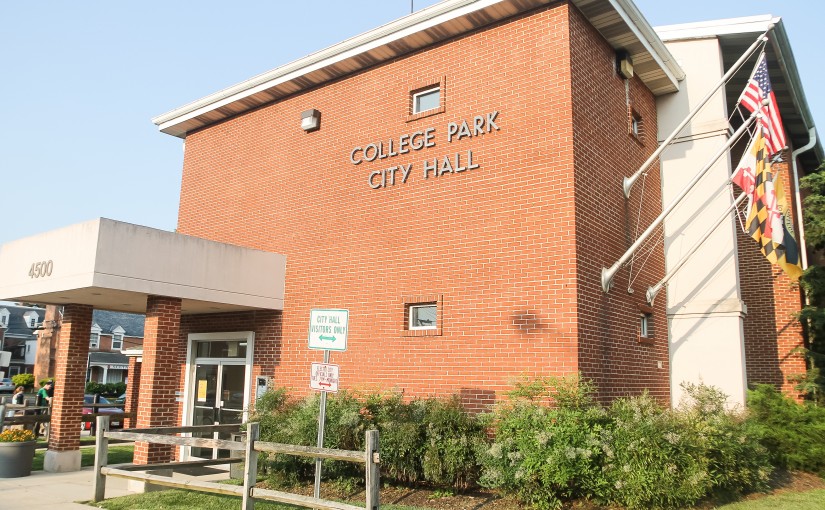The College Park Mayor and City Council voted Tuesday to adopt an ordinance authorizing the city to acquire two Route 1 properties to expand City Hall.
The council passed the resolution 5-4, with Mayor Patrick Wojahn casting the tie-breaking vote, to acquire the properties either through negotiation or eminent domain, which refers to the government power that allows it to seize private property for public use while compensating the owners.
The city has been in discussion with Margaret Byrd, the owner of the 7409 and 7411 Baltimore Ave. properties, for more than a year, but they have not reached an agreement. Smoothie King, Subway, Hair Cuttery and Shanghai Cafe, which are all located on the properties, would all be affected by the acquisition.
If an agreement is not reached, the city can condemn the properties and convert them into part of the new City Hall expansion.
[Read more: College Park City Council votes to acquire local swim club for public use]
Representatives of north College Park voted against the motion and representatives of south College Park voted for it.
Wojahn said the city has authorized the possibility of exercising eminent domain before in order to help reach agreements in negotiations, such as when the city parking garage was constructed.
“Sometimes in order to ensure that the people we are negotiating with are taking things seriously, [eminent domain] needs to be put on the table,” Wojahn said.
The authorization of eminent domain will help speed along the negotiation process, District 2 Councilman P.J. Brennan said, adding that the city will honor the leases of the affected businesses and will work to keep them in downtown College Park.
“We have an owner that is not motivated,” he said.
For the past 20 years, the city has been interested in expanding City Hall. City Manager Scott Somers said the current location is too small and antiquated and most residents don’t know where it is.
In November 2014, the council chose its existing Knox Road location for the redeveloped building.
The planned redevelopment of City Hall — in partnership with the University of Maryland and Terrapin Development Company — will be about 30,000 square feet and four stories tall facing Route 1. This will help establish a stronger civic presence and revitalize downtown College Park, Somers said.
Part of the planned redevelopment is the construction of a 45,000 square foot university office building and a separate 29,000 square foot office building, both in the City Hall block.
More than two dozen residents spoke at a public hearing before the mayor and council voted to adopt the ordinance.
Thomas Hughes, the franchise business owner of the Smoothie King that would be affected, said the shop has been open for 20 years, pays thousands of dollars in taxes every year and employs 12 full-time workers. He said it “really hurts” the city may be the one to close it down.
Some said it is not the city’s place to acquire properties by eminent domain, with one District 1 resident, Jordan Schakner, calling the City Hall redevelopment proposal a “vanity project” for the council and a “Christmas present” to this university that is paid for by small business and resident tax money.
“If they don’t want to sell it, the government should not take it by force,” District 1 resident Rick Hudson said.
Other residents were in favor of adopting the ordinance to move forward with the decades-long project.
“[Eminent domain] should be used in exceptional circumstances,” said District 3 Councilman-elect John Rigg. “This rises to that occasion.”
[Read more: Route 1 neighborhoods could see more development thanks to PG County zoning laws]
While the acquisition of the properties might be bad for small businesses in the short run, it will be beneficial for them in the long run, said District 1 Councilwoman-elect Kate Kennedy.
Bringing more office space downtown that is not dependent on the seasonal student activity helps attract more year-round economic activity, Somers said.
After the public hearing, District 4 Councilwoman Mary Cook moved to table the item until September. The motion failed 5-4.
“This vision that we’ve now been working on for several years to create a high-quality down town, we’ve made a lot of progress in that direction,” Wojahn said. “This particular project is the next step in creating that vision.”



